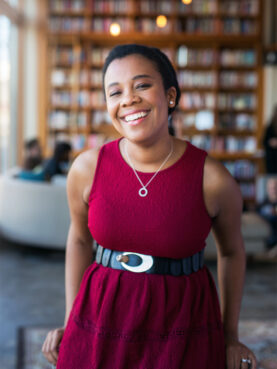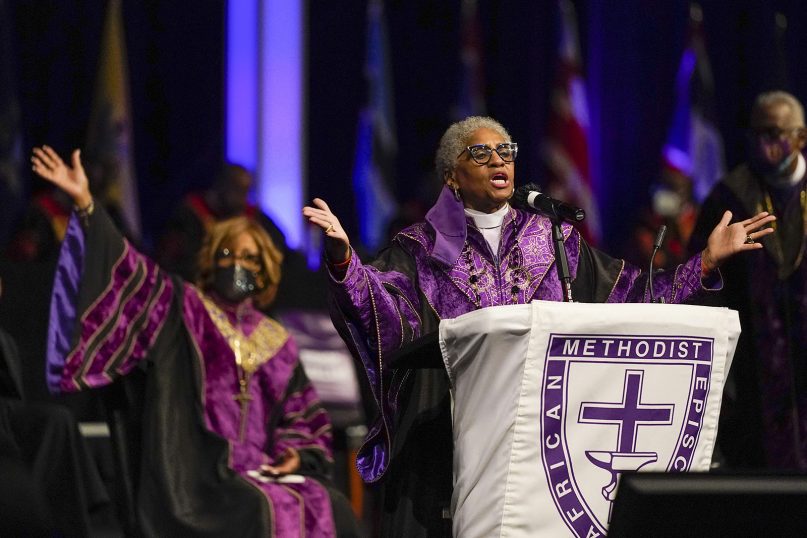(RNS) — The Black church is one of the most visible institutions in American life, its national leaders’ names nearly synonymous with the civil rights movement from the 1960s to the present day. It’s a powerfully unifying force, with 74% of Black adults identifying as Christian. Before the pandemic, some 40% of those Christians reported attending a church service in the prior week.
Behind that legacy of social justice and faithfulness are prophetic spiritual leaders and theologians, some of them household names, others all but anonymous to the wider world.
The Rev. Jennifer Bailey, founder of the Faith Matters Network, is dedicated to gathering the wisdom of fellow Black Christian thinkers for the benefit of a far broader circle of spiritual social justice leaders.
“Faith Matters Network was really born out of a curiosity about how folks inclined to see themselves as rooted in a social justice ethic were finding and building meaning and community,” said Bailey in a recent interview.
A minister in the African Methodist Episcopal Church, Bailey wants her network to include formally trained clergy from across the spectrum of faith, but also laypeople who have taken on roles of sacred service in faith-based organizations.

The Rev. Jennifer Bailey. Courtesy photo
Bailey sees this approach as necessary in a time when religion is undergoing fundamental changes in America, especially among millennials and Gen Z, groups that are often portrayed as having lost interest in religion. “There’s still a deep yearning for spirituality and deep connection and community,” she said, reprising a theme from “To My Beloveds,” her 2021 book on race, loss and what she calls “communal hope.”
“Whether people call the (higher power) God and whether or not they go to services,” she explained, “they are ‘composting’ religion, taking what has been most nourishing and useful and letting go of the rest.”
Bailey grew up in a largely white part of Chicago, a place she writes in “To My Beloveds” that “resists change in the name of tradition and where difference is a deficit rather than a strength.” She wrote that the school playground was its own education, teaching her that “the politics of race is a messy and violent business.”
Rather than succumbing to those divisions, Bailey became a bridge builder.
She began as a community organizer, working mostly on food justice, before and while attending Vanderbilt Divinity School. When she graduated in 2014, she launched Faith Matters Network, working to create “a place of care at the center of social movements, focusing on clergy, community organizers and activists — healing the healers,” she said.
“We are really committed to thinking about how we accompany folks in the work of social justice for the long term, over the course of their lives, and empower them with the tools and resources they need to be committed to that vision of a more just and grounded society,” Bailey said.
In 2016, after a bruisingly divisive presidential election, she collaborated with the grief support organization The Dinner Party, which helps to bring people who have lost a loved one for a meal, to create The People’s Supper. Building on the Dinner Party’s model of growing mutual support out of communal dinners, The People’s Supper facilitates meals for communities facing deep divisions: places torn apart by disasters, racial barriers or politics.
Since 2017, Bailey noted, the organization has convened 2,000 meals in 135 communities to bring “people together across lines of difference to engage constructively on issues affecting their communities.”
Grief and loss of hope, she believes, are key to understanding these lines of difference. “In the United States, there’s a cultural disconnect around notions of death in grief. I tend to see practices that are most helpful to people in the communities of religious minorities, which have a great deal of practice around how we tend to death or loss.”
In the years since the COVID-19 pandemic began, American society has been deluged with grief, but there are also feelings of loss that come from the upheavals in American life. “Right now, in religious communities, we seem to be stuck focusing on what is dying,” said Bailey. “We have much grief. We need rituals to help us with it, so that we can also see what is yet to be.”
In recent years Bailey made it part of her spiritual practice to ask three questions that she first heard at a retreat for activists of color: What is dying? What wants to emerge? And what is blooming beautifully?
“Our society pays such attention to what is dying, to the detriment of realizing that there are things that are emerging right now, or that want to emerge, and that there are things blooming beautifully already,” she said.
The Black church has much to say, and do, about the experience of loss. “In the Black church,” Bailey said by way of example, “we don’t do funerals, but homecoming services. Some last eight hours, filled with music, joy and hope. They help us understand what comes next instead of focusing on what no longer is.”
Recovering from loss is particularly part of the experience of Black women, and Bailey sees wisdom in their lived experience, as people who have suffered deeply and healed from the wounds of life. It’s no coincidence, perhaps, that this time in American history has seen the rise of female theologians and spiritual leaders like Bailey.
But Bailey suggests that religion of every stripe has a place in helping to process loss and discern what comes next. She wants Americans to “recover, repair and reimagine the spiritual resources that our traditions have access to,” whether historically American traditions or so-called minority faiths.
“First comes recovering ancestral wisdom and practices that have been lost or were undervalued,” said Bailey. “Second comes repairing the deep breaches in our interpersonal relationships that replicate destructive patterns. Then we can reimagine our human possibilities.”
This reimagining can happen in a congregational context, at a protest or in quiet ways, said Bailey. “All of it is sacred and holy to me.”





